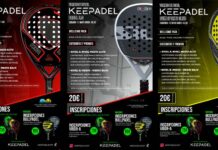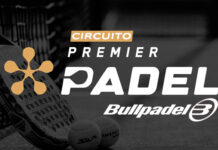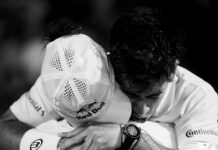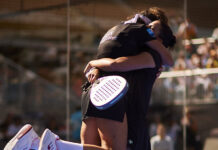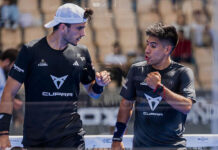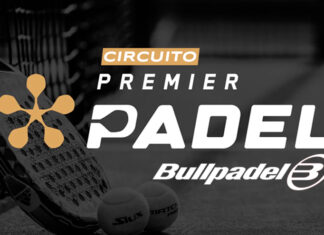Padel World Press .- With a previous article I wrote about the concept of 'nikefobia' or fear of winning and the causes that originate it. Now, in this particular case, I'm going to focus on how to deal with that fear of winning ... I mean, what can I do if I have nikephobia?
The first step, in order to 'cure' or 'intervene is ... Recognize that fear of winning, being aware that your game is not what it should be and assuming situations like this: «Yes, it's true, I recognize that I am afraid of winning and that when I compete I am below my level and I am afraid not play as I normally do.
Despite how simple it is to say it, it is not so easy to recognize it, assume it and 'publish it' ... By this we mean to communicate it to the coach or professionals who can help (mainly, the sports psychologist specialized in paddle tennis or tennis).
Steps to follow in the intervention
To learn the psychological techniques to face and overcome the fear of winning, a systematic and interdisciplinary intervention.
The steps to follow in an intervention to train yourself mentally to face the fear of winning are personalized. There are no universal recipes. The psychological characteristics of each player are personal and particular, so the intervention must be adjusted individually.
- Evaluation of Competitive Behavior
Any coach or sports coach can not establish lines of action or intervention without get to know the athlete beforehand. That is why a good 'diagnosis' of the situation or difficulty of the padel player is important. It is necessary to know how you perform in training and in competition, what are your strengths and weaknesses, your technical level and your mental level, your routines, your goals, thoughts, expectations, etc.
Therefore, it is essential to make a Self-evaluation of the Competitive Behavior of the padel player. The evaluation of competitive behavior in paddle tennis (CCP) can be done using observation as the most reliable method of collecting information; or, through an information gathering instrument such as a competitive behavior questionnaire.
- Systematic Observation: audiovisual media can be used to record actions, training sessions, attitudes, games ... The evaluators can be the coaches and / or physical trainers themselves. The recording of the executions allows later 'feedback' much necessary for the planning of the psychological work.
- Competitive Behavior Questionnaire (CCP): The questionnaire is completed once the competition has been completed, trying to be as objective and real as possible. It identifies the possible variables that affect performance in competition and that may cause fear of winning. After each competition we collect our impressions at the CCP.
For a correct and effective diagnosis of the causes that affect the padel player's fear of winning, the two instruments should be used together, the observation and the questionnaire, thus obtaining greater reliability. In addition, once the diagnosis is obtained, is contrasted with the professionals who work with the paddle tennis player. These tests are usually repeated in several temporal sequences to obtain more objective and real data.
- Analysis of the Causes
Once we know what are the causes that individually are causing this feeling of anguish, and they have been objectively specified, it is time to analyze them and determine the degree to which they are negatively influencing the performance of the paddle tennis player.
The causes, mainly, focus on several aspects, collected in the previous article:
- Excess pressure
- Lack of trust.
- Excessive tension
- Emotional lack of control
- Negative thoughts.
- Badly focused responsibility
- Other.
These causes, and others that have been detected in the evaluation, are scaled and classified according to the importance and negative effect they are causing on the paddle tennis player.
- Intervention Planning
After analyzing the causes and their classification, it is time to establish an intervention and / or mental training plan to deal with each of these elements that are causing poor performance.
This planning is interdisciplinary, since it is necessary to carry out an integration in training and in games of mental preparation techniques and strategies, together with the techniques and tactics of paddle training itself.
In addition, there is a competitive calendar, which must also be agreed with the sports psychologist, trainers and the player. And the most important is the establishment of objectives and goals in the short, medium and long term.
- Application of the Techniques and their Follow-up
The best time to implement a mental training program is in the Preseason.
It must be carried out in special sessions. When they are mastered, they will be done in the 10-15 minutes before or after the physical training session. The next step will be to practice the skills in simulated competition. And finally, psychological skills should be used in the real competition.
The final goal of padel psychological training should be an integrated part, perfectly assembled, with the other procedures aimed at optimizing performance. It is not an independent or parallel training. To achieve this integration of the physical and the psychic it is necessary a sufficient time of learning, so that it comes to be realized automatically.
The time required to master psychological strategies varies from one player to another, and depending on the difficulty of what you want to learn. It will depend on the time available, the level of the basic psychological qualities, the dedication of the players, the speed of learning, and above all, the degree of mastery achieved.
For example, if a new technique is introduced, special sessions must be used, about three times a week, for a time, until it is mastered. Once mastered, it must be integrated into physical training. Sometimes it will be necessary to dedicate special sessions, outside of training, to already known mental skills, when they have weak points in the player's performance and it is necessary to correct or improve. There are no recipes.
The total duration of a psychological training program: Two or three learning sessions are not enough to acquire the strategies and psychological techniques to improve sports performance. In order for the first benefits to appear demonstrably, at least three weeks of practice are required. And to master a skill perfectly, be it physical or mental, it takes time.
With time of practice, the mastery of the learned psychological strategies becomes automatic, so that the paddle player can simply perform them 'Letting go'. The last goal to be achieved is precisely this, the automated practice of mental skills that have proven effective to optimize performance.
And remember… DIVIÉRTETE ALWAYS playing paddle.
Fran Cintado
Gallery: Time2Padel
* You can follow all the news of the world of paddle in our profiles of Facebook y Twitter as well as subscribe to our Newsletter .


